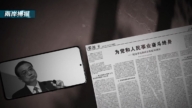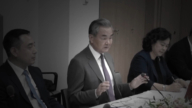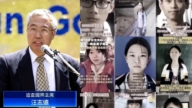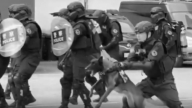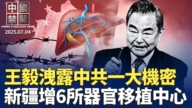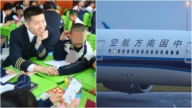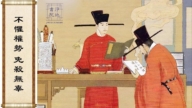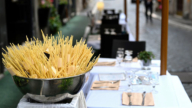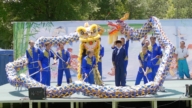【新唐人2014年11月10日讯】11月8号是中国记者节,官方媒体微信刊载中共总书记习近平眼中“好记者”的十大标准,强调新闻机构和新闻工作者都是为党和人民工作的,不论在何时何地,都要对党和人民负责。有媒体认为,中共眼中的好记者,其实就是党的好喉舌。在中国从事多年新闻工作的老记者们则指出,中国没有记者行业,只有宣传。
在11月8号大陆15届记者节当天,人民日报海外版微信公共账号“学习小组”,发表了“习近平的心目中的好记者”一文。文章从习近平的历次讲话中,总结出习近平眼中“好记者”和“坏记者”的标准,并号称“不论何时何地,都要对党和人民负责”、“讲好中国故事”等“好记者”必须具备的10项条件。
文章还强调,新闻机构和新闻工作者,都是为党和人民工作的。
《新华社》则报导说,通过“好记者讲好故事”的演讲活动,一些参与演讲的记者,更坚定了做一名所谓“好记者”的追求。
香港媒体评论说,数十年来,“党”眼中的“好记者”,无非是应验了一首已经流传了多年的民谣:“我是党的一条狗,蹲在党的大门口。党叫咬谁就咬谁,让咬几口咬几口。”
中国民主党组党成员马强,在中国有10年左右的记者生涯,经历了记者和新闻检查的不同角色。马强说,在中国如果记者不做“看门狗”,就没法干下去。
中国民主党组党成员马强:“只要在记者这个行业里面,不做这个看门狗,可能性就没有了,发东西就发不出来,在中国理论上没有记者这个行业,只有宣传这个行业。89以后,他们就在做一个很大的盘子,要把江山从新夺回到红二代手里,到习基本上完成了这么一个过程,现在是撕了面皮,不再用遮羞布来遮掩的时候了。”
1941至1945年,中共前党魁毛泽东进行延安整风运动时,明确规定报纸是政治斗争的工具,“党性第一”是报纸的第一原则。中共于1949年夺权后,新闻工作的使命开始挂上“人民”的大旗,强调新闻工作者是“党和人民的喉舌”。
香港媒体说,因为“党”已经完全代表了“人民”,当有民众不拥护共产党时,他们就不再是“人民”,而成了“阶级敌人”。
大陆著名战地老记者铁流,曾经为中共出生入死,81岁的他,当今却正被关在中共的大牢里。
原陕西电视台编辑马晓明:“十八大四中全会期间, 警方到我家提出来,不可以接受境外的采访,不许向境外发消息,如果我不能做到他们提出的要求的话,就要把我带走。”
原陕西电视台编辑马晓明,从年轻时在部队开始参与新闻工作,因89年支持学生运动遭到中共整肃,而后因为支持访民遭到多次关押和劳教。
马晓明说,中共对中国民众的洗脑毒害无比深刻。当他的亲戚得知警方警告以上这些话时,他的亲戚们还认为当局很宽容,相反,北京支持抓捕占中民众的消息,他们却一无所知,还反过来质问马晓明从哪里听来的谣言,劝告他不能给政府添乱。
马晓明:“中共从控制媒体对人民几十年的毒害,使人丧失了最起码的分析和判断能力,这样人们就可以服服帖帖的接受它的统治,而且还觉得这些讲真话的媒体是不可信的,是别有用心的,是非颠倒成这个样子。”
30年前,中国媒体人开始呼吁出台新闻法,1988年,有关方面还曾酝酿起草一部新闻法,但是到现在,新闻法还是不见踪影。中共元老陈云的一段话点出了没有新闻法的秘密。陈云说,国民党统治时制定了一个新闻法,共产党人就抓它的辫子,钻它的空子。现在共产党当权,还是不要新闻法好,免得人家钻空子。因为没有了法,共产党想怎样控制,就怎样控制。
采访/田静 编辑/刘惠 后制/萧宇
Is Journalism as a Profession Disappearing in China?
Nov. 8 is China’s Journalist Day.
Chinese Communist Party (CCP) leader Xi Jinping’s top 10 list
of good journalism was recently publicized through WeChat.
It was emphasized that news agency and journalists
work for the Party and the people.
They are responsible for the Party and the people.
Some media commented the good journalist
is a puppy of the Party.
Veteran journalists pointed out that journalists don’t exist
in China. All it has is propaganda.
On the Journalist’s Day, a public forum on WeChat published
an article entitled, “The good journalist by Xi Jinping".
It described the standards of good and bad according to
Xi Jinping.
It also listed the 10 standards of a good journalist,
such as “be responsible for the Party and the people,
no matter when and where", “tell good Chinese stories",
and so on.
The article also stressed that news agencies and journalists
should work for the party and the people.
Xinhua News Agency reported the series of activities.
The list included “good journalists tell good stories" will
ensure “good" qualities of the participating journalists.
Hong Kong’s MingPao Daily commented, that for decades,
a ballad covers it: “I am a Party dog, squatting at the gate
of the Party. I bite when Party asks me to, and count the
bites as the Party asks me to."
China Democracy Party member, Ma Qiang, was a journalist
in China for about 10 years.
He held roles as a reporter and a news monitor.
He indicates that in China, a Party dog is a must
for the Chinese journalist to survive.
Ma Qiang, “There is no way to be a journalist in China
without being a Party dog. Your work will not be published.
Theoretically, there is no journalist profession in China,
only propaganda.
After 1989, the CCP has been creating a big dish, that is to
recapture the power for the red second generation.
Xi has basically completed this creating process.
Now, it is time to split the fig leaf. They don’t need
to hide it anymore."
Between 1941 and 1945 when Mao Zedong was engaged in
the Yan’an rectification movement, it was clearly defined
that newspapers are the tool for political struggle, “Party
first" is the first principle of the newspaper.
When the Communists took over the power in 1949, the
“people" banner became the mission statement of journalism.
Journalists were stressed as “the mouthpiece of the Party
and the people".
MingPao Daily commented, “Because the party has fully
represented the people, those who do not support
the Communist Party would no longer be the people,
but the class enemies."
For instance, renowned Beijing writer and underground
publisher Tie Liu was imprisoned at the age of 81.
Former Shaanxi TV editor Ma Xiaoming, “Police came to my
house and proposed I will not accept interviews or issue
news during the fourth plenary session. Otherwise, they
will take me away."
Ma Xiaoming has been involved in news work since young
at the army.
He was purged by the regime for supporting the 1989
Students movement.
He was then imprisoned and sent to labor camp
several times for supporting petitioners.
Ma Xiaoming comments that the Chinese people have
been severely brainwashed.
His relatives actually believed the warning of the police
showed the tolerance of the authorities.
Knowing nothing about the regime arresting the Chinese
who support Occupy Central, his relatives questioned Ma
where the rumors came from and advised him not to
cause troubles for the government.
Ma Xiaoming: “Chinese have been intoxicated for years by
the Party-controlled media loosing means to analyze or judge.
Through the media control, people are obedient to its ruling.
They even feel those honest media are not trustworthy,
but have some ulterior motives.
The right and wrong has been completely distorted."
30 years ago, the journalists have demanded the media law.
In 1988, the authorities were in the process of drafting
a media law, but media law remains missing in China.
The Communist patriarch Chen Yun’s passage has pointed
out the reason for no media law in China today.
Chen Yun said, “The Kuomintang developed a media law,
and the Communists manipulated the loopholes of the law.
The Communist Party is in power now, it’s better not to have
a media law so that no one can take advantage of loopholes.
Without the law, the CCP can control however it likes to."
Interview/TianJing Edit/LiuHui Post-Production/XiaoYu


